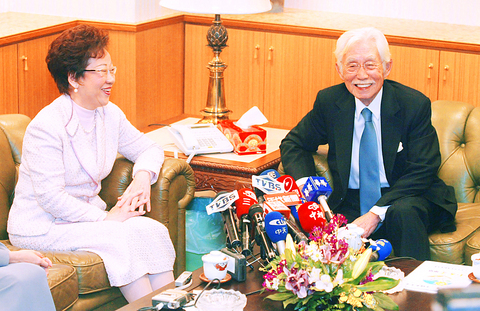Despite his controversial remark that "someone in a skirt would not make a good commander-in-chief," former presidential adviser Koo Kwang-ming (
Koo said his comment was made on the basis of China's military threat and possibility of military confrontations.
"But there won't be a war in the Taiwan Strait," Koo said, "because China wouldn't want to drive away foreign investors and risk an economic collapse."

PHOTO: CNA
In the worst-case scenario, Koo said: "I would welcome [a war]."
"Taiwan's biggest crisis is the lack of a national consensus on the nation's future despite the military threat from China," he said. "But if China were to launch a military attack against Taiwan, a consensus would be formed within a week."
Koo made the remarks while meeting with Lu at his office in Taipei yesterday morning.
Denying his notorious remark was targeted at Lu and that he had changed his tune, Koo said he admired Lu's determination to run for president.
"She is a very special woman," he said. "It is not easy to be consistent all these years and I wish her all the best."
If all the female voters supported her, Lu would easily be elected, Koo said, adding that if Taiwan had a female president, he believed there would be a "big change" in the nation's politics.
Koo said he expected future national leaders to be strong-minded, reliable and capable of responding in time of crisis.
Dressed formally in a pink top and skirt, Lu joked she should probably have worn trousers.
She said she did not visit Koo to discuss her presidential bid, but rather to raise funds for an after-school educational program she initiated.
Lu, however, complimented herself as the first female politician to advocate the twin concepts of "connecting with the international community" and "preventive diplomacy."
"Taiwan's democracy is the best line of defense," she said. "That's what I call preventive diplomacy.'"
Hailing herself as an "all-round" national leader, Lu criticized her male contenders for hiring specialists to map out their election platforms, while she came up with her own.
Lu is competing with former premier Frank Hsieh (
Meanwhile, Hsieh yesterday visited a pro-independence group and promised to participate in the TV debate being organized by the group on March 24.
Saying that politicians must accept constant challenges, Hsieh said he accepted the invitation right after the organization announced its plan and before the DPP decided to hold one of its own.
While the party's presidential hopefuls are obliged to attend debates organized by the party, they should also take advantage of other events hosted by other institutions to publicize their position.
Hsieh said President Chen Shui-bian (
In a separate setting yesterday, Su said the party primary would not be necessary if the president's attempts to mediate a solution succeeded.
After a second round of mediation between Chen and the four presidential hopefuls on Tuesday night, the four agreed to hold negotiations to select the party's presidential candidate, vowing that they would neither withdraw from the DPP nor run on their own if they did not secure the party's nomination.
Additional reporting by Jimmy Chuang

Chinese Nationalist Party (KMT) Chairman Eric Chu (朱立倫), spokeswoman Yang Chih-yu (楊智伃) and Legislator Hsieh Lung-chieh (謝龍介) would be summoned by police for questioning for leading an illegal assembly on Thursday evening last week, Minister of the Interior Liu Shyh-fang (劉世芳) said today. The three KMT officials led an assembly outside the Taipei City Prosecutors’ Office, a restricted area where public assembly is not allowed, protesting the questioning of several KMT staff and searches of KMT headquarters and offices in a recall petition forgery case. Chu, Yang and Hsieh are all suspected of contravening the Assembly and Parade Act (集會遊行法) by holding

PRAISE: Japanese visitor Takashi Kubota said the Taiwanese temple architecture images showcased in the AI Art Gallery were the most impressive displays he saw Taiwan does not have an official pavilion at the World Expo in Osaka, Japan, because of its diplomatic predicament, but the government-backed Tech World pavilion is drawing interest with its unique recreations of works by Taiwanese artists. The pavilion features an artificial intelligence (AI)-based art gallery showcasing works of famous Taiwanese artists from the Japanese colonial period using innovative technologies. Among its main simulated displays are Eastern gouache paintings by Chen Chin (陳進), Lin Yu-shan (林玉山) and Kuo Hsueh-hu (郭雪湖), who were the three young Taiwanese painters selected for the East Asian Painting exhibition in 1927. Gouache is a water-based

Taiwan would welcome the return of Honduras as a diplomatic ally if its next president decides to make such a move, Minister of Foreign Affairs Lin Chia-lung (林佳龍) said yesterday. “Of course, we would welcome Honduras if they want to restore diplomatic ties with Taiwan after their elections,” Lin said at a meeting of the legislature’s Foreign Affairs and National Defense Committee, when asked to comment on statements made by two of the three Honduran presidential candidates during the presidential campaign in the Central American country. Taiwan is paying close attention to the region as a whole in the wake of a

OFF-TARGET: More than 30,000 participants were expected to take part in the Games next month, but only 6,550 foreign and 19,400 Taiwanese athletes have registered Taipei city councilors yesterday blasted the organizers of next month’s World Masters Games over sudden timetable and venue changes, which they said have caused thousands of participants to back out of the international sporting event, among other organizational issues. They also cited visa delays and political interference by China as reasons many foreign athletes are requesting refunds for the event, to be held from May 17 to 30. Jointly organized by the Taipei and New Taipei City governments, the games have been rocked by numerous controversies since preparations began in 2020. Taipei City Councilor Lin Yen-feng (林延鳳) said yesterday that new measures by